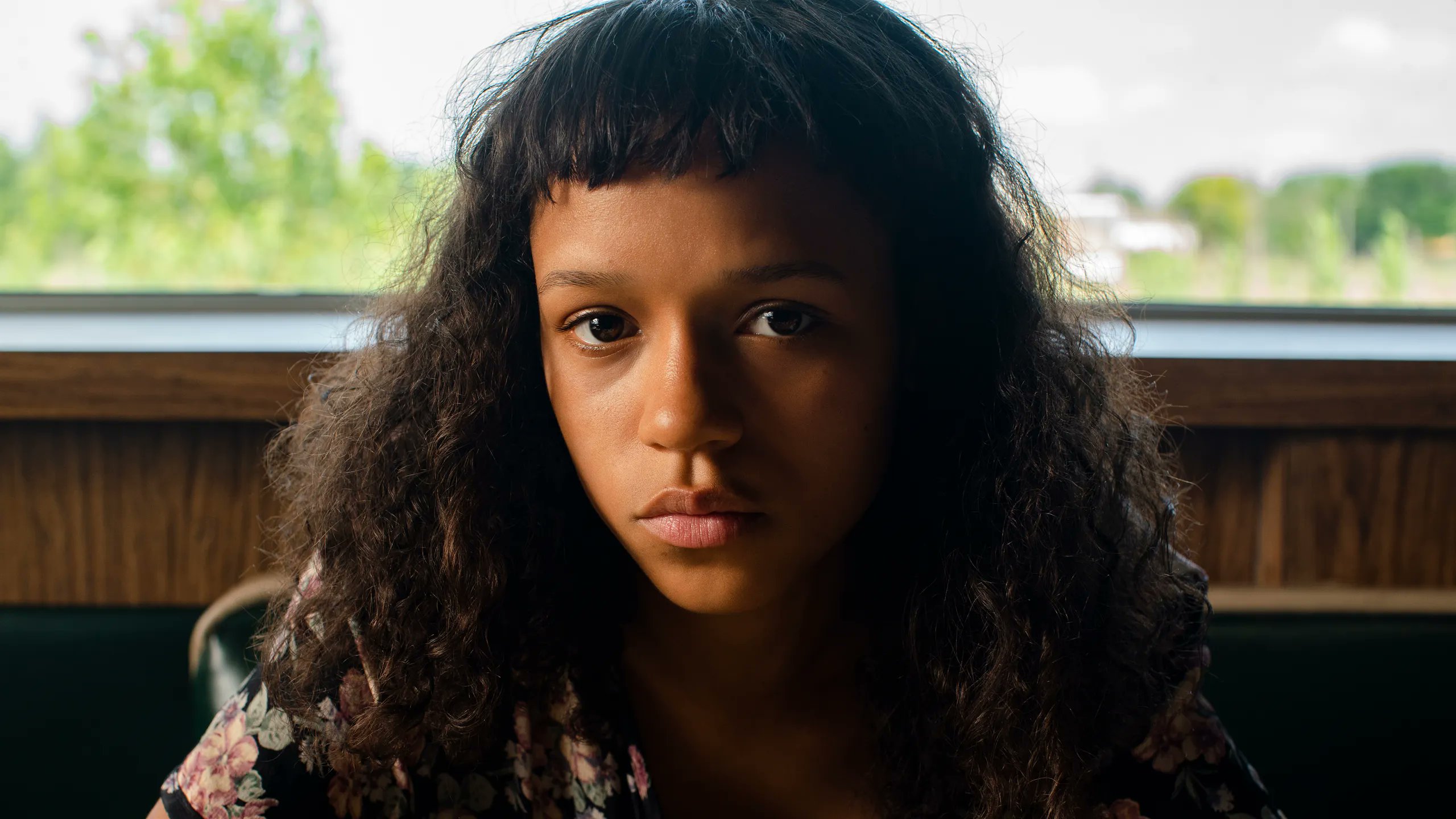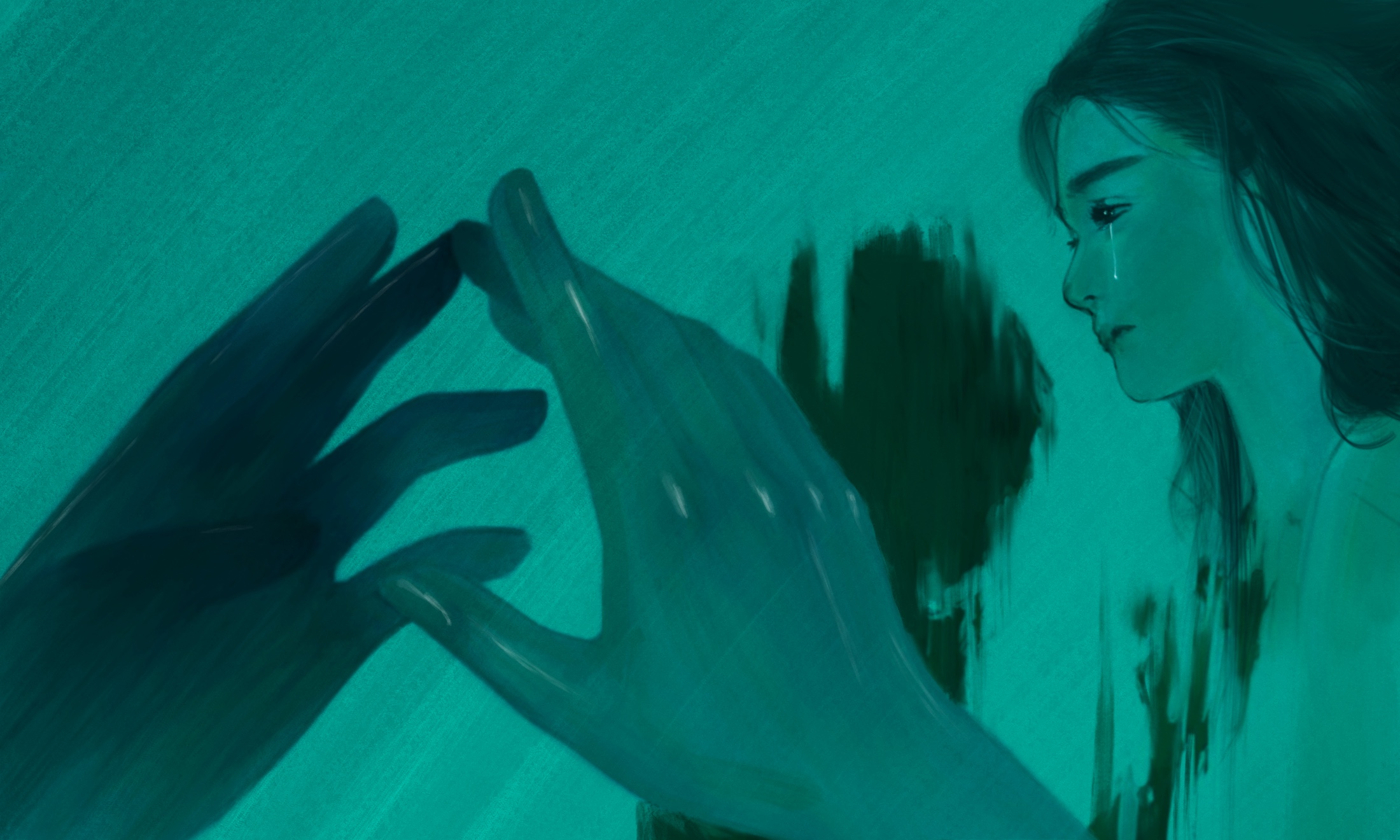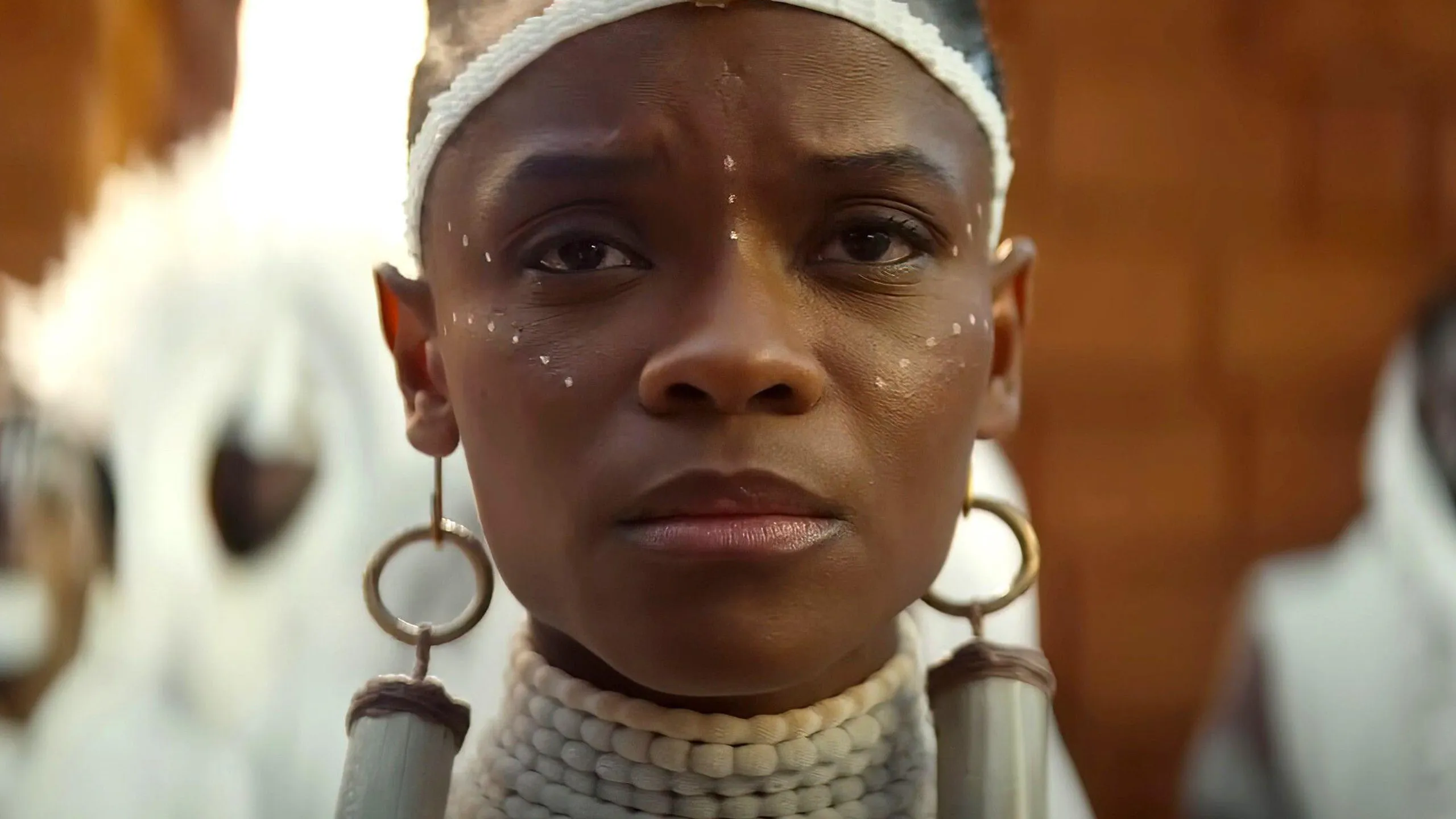
Courtesy of Marvel Studios
Black Panther: Wakanda Forever explores grief, but doesn’t give up on hope
We sat down with Lupita Nyong’o, Letitia Wright and Winston Duke to talk about rebooting Black Panther and the on and offscreen impact of Chadwick’s departure.
Timi Sotire
18 Nov 2022
The Marvel Studios introduction – which is typically a montage celebrating the stars of the Marvel Cinematic Universe (MCU) – in Black Panther: Wakanda Forever was a silent tribute to Chadwick Boseman, who played the protagonist T’Challa, King of Wakanda and the eponymous Black Panther. T’Challa’s family carry out his funeral rites adorned in white, as the rest of the nation joins in the procession as Shuri, T’Challa’s science-whiz younger sister, solemnly holds the Black Panther mask. It’s both a celebratory and sombre affair, with the brightly dressed costumes and clear-blue Wakandan skies acting as a stark contrast to the melancholy experienced by the cast and audience alike.
Many parallels can be drawn between T’Challa and Boseman – in particular, their stoicism, as Boseman kept his colon cancer diagnosis in 2016 private, and continued to dedicate himself to his craft and secure the largest role of his career. His passing in 2020 from the illness sent shockwaves throughout the world. In the opening scene of Wakanda Forever, T’Challa dies of a sudden illness that his family is unable to save him from, mirroring how helpless Boseman’s loved ones felt as his illness progressed.
A week before the hotly anticipated European premiere, gal-dem sat down with some of the stars of Wakanda Forever in the plush settings of the Soho Hotel to explore the film. Both his co-stars and fans alike were surprised that Boseman had been battling silently. “[His death] changed the direction of the story. Instead of pretending like it didn’t happen and recasting, or glazing over it, we leaned into it,” Lupita Nyong’o, who plays Nakia, tells gal-dem.
Even in his absence, Boseman’s castmates are primed to sing his praises. “He was a generous, fierce collaborator, who shared a lot of information and resources,” says Winston Duke, who played M’Baku. It’s no easy feat to reboot a superhero sequel without its lionheart. Wakanda Forever avoided making a martyr out of T’Challa, exploring his shortcomings through the Michael B. Jordan cameo during Shuri’s journey through the ancestral plane after taking the synthetic, heart-shaped herb she manufactured to embody the Black Panther powers.
“Ryan decided to make the film about the loss of T’Challa. In doing so, this is an exploration of grief and how people who have lost someone move on,” Nyong’o tells gal-dem “It was different for everybody,” remembers Duke. “Everyone had a different relationship with Chadwick”.
This is especially true for Letitia Wright. The rest of the film centres around her character Shuri, as she steps into power in the wake of her brother’s death, protecting Wakanda (and the rest of the world) from the vibranium-rich underwater kingdom of Talokan. It’s a major development from the supporting role she had in the first film, which mainly provided comic relief for the audience. In Wakanda Forever, Shuri is forced to grow up. It’s a parallel Wright has felt in her life off-screen too. “This time, there’s more that’s been asked of me. The pressure is there because that was my big bro. I wanna make him proud.” What helped Wright overcome the pressure was focusing on why she was doing it. ”I tried to realign with my ‘why’. My ‘why’ is Chad, Ryan, my cast and my crew.”
That re-centering required a certain amount of rawness from Wright, and one that wasn’t always comfortable at times. “As human beings we have different layers… It was really uncomfortable coming onto the set and not be like ‘OK, I’m gonna be the fun little sister today’. I had to carry this weight of the emotion of this movie. It was an opportunity for us to see a young girl become a woman right before our eyes.” Her reflections here signal another point of departure between Black Panther and Wakanda Forever. Where the former was acclaimed for its celebration of the ‘Strong Black Woman’ in its Dora Milaje, Wakanda’s all-female special forces, headed by Okoye (played by Danai Gurira), the latter reminds the audience that, to be strong truly, you need to embrace your vulnerability.
Wakanda Forever also reminds us of the power of Black sisterhood. The audience is introduced to RiRi Williams (played by newcomer Dominique Thorne), another young scientific protégé who dons the Ironheart costume. While Shuri is processing the loss of her brother, a friendship and mentorship form between her and RiRi. “In the first film, her big brother is her mentor. There’s a missing space for someone she can relate to, and RiRi fills that space,” Wright says. “But, she’s protective over her [RiRi] too. It’s another opportunity for Black women to see themselves on-screen, and how much we love and care for each other.”
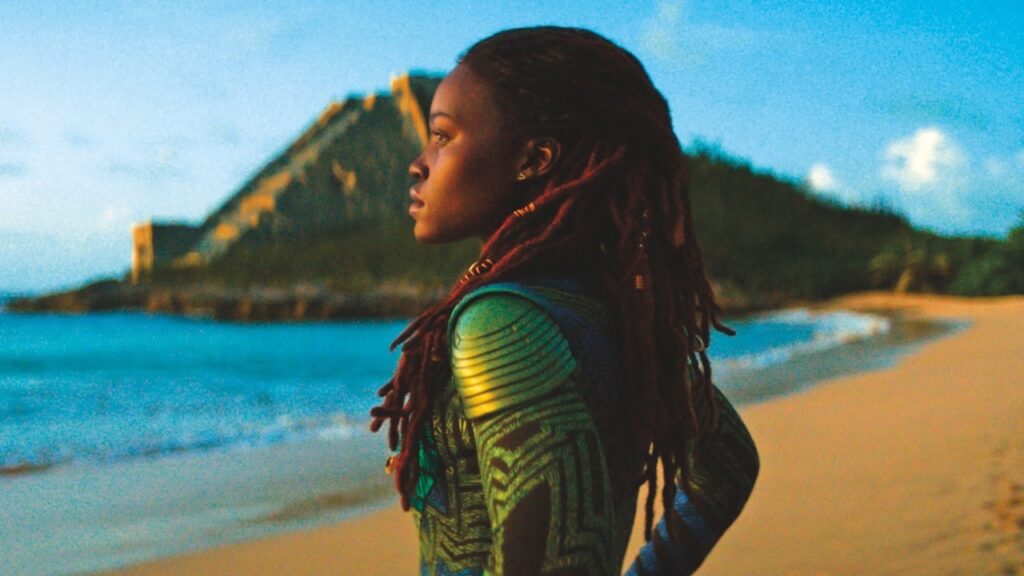
Shuri’s growth is such a central part of the story of Wakanda Forever. She initially turns to technology in order to process her grief, rejecting the Wakandan customs adopted by her family. But throughout the film, Shuri slowly embraces Wakandan tradition, deciding to move forward by burning her funeral clothes, something encouraged by her mother earlier in the film. Ironically, this experience is seemingly opposite to Wright who is openly very spiritual – her Instagram bio currently reads “Gods (sic) child”.
She acknowledges the role reversal: “I’m the opposite [to Shuri]. I wanna embrace it [science] more. I’m learning more from Shuri about the importance of science, and Shuri is learning from me about spiritual connection and the beauty of worship and prayer.”
But the mystery of how the franchise could continue without its central character wasn’t the only talking point as rumours abound about Wright’s beliefs and behaviour on set. In 2020, Wright was criticised for sharing a controversial video by the self-proclaimed Christian prophet, Tomi Arayomi, that expressed scepticism over the Covid-19 vaccine. Wright later stated “my intention was not to hurt anyone, my ONLY intention of posting the video was it raised my concerns with what the vaccine contains and what we are putting in our bodies.” More than two years on, she explains that playing Shrui has been an eye-opening lesson. “Shuri is very matter-of-fact and scientific in her approach, and that’s beautiful.”
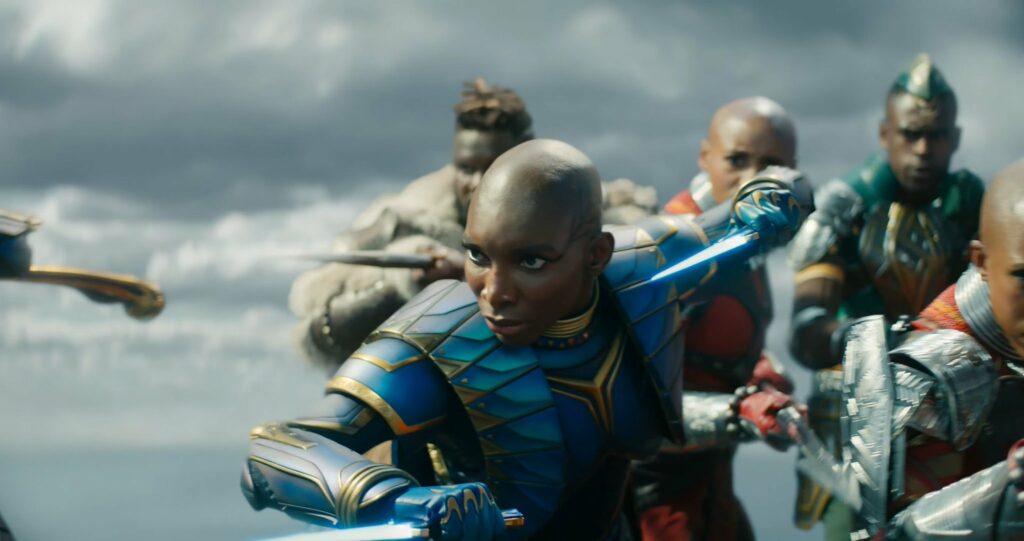
Black Panther: Wakanda Forever is already a worldwide box office success, grossing over $330 million worldwide. In a grief-stricken age amid a pandemic it’s portrayal of grief with care and nuance captures the zeitgeist and soothes audiences. But, as Nyong’o reminds me, “despite the honesty and depth of the grief we were exploring, it does not compromise the spectacle.” The sequel marks a significant tonal shift from its predecessor, yet die-hard MCU fans can still expect a plethora of fight scenes, an exploration into the new underwater nation Talokan, and an epic final battle.
Grief is an emotion that can feel paralysing – when you lose someone close to you, it’s as if your whole world has stopped. Watching the characters endure this pain in Wakanda Forever was hard to watch, and may be triggering for some. But it taught me that, although this life is finite, death cannot rob us of the impact our loved one’s have had on us. T’Challa (and Boseman) continue to survive in the hearts and minds of those whose lives they’ve impacted. Even in death, their presence is felt.
The contribution of our members is crucial. Their support enables us to be proudly independent, challenge the whitewashed media landscape and most importantly, platform the work of marginalised communities. To continue this mission, we need to grow gal-dem to 6,000 members – and we can only do this with your support.
As a member you will enjoy exclusive access to our gal-dem Discord channel and Culture Club, live chats with our editors, skill shares, discounts, events, newsletters and more! Support our community and become a member today from as little as £4.99 a month.




